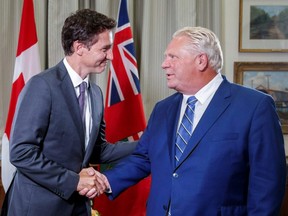
When Prime Minister Justin Trudeau sits down with the premiers in Ottawa on Tuesday, it will be the first face-to-face meeting in four years and two months. Not that they haven’t had many conference calls and one-on-one meetings in between.
Tuesday’s get together to discuss health care, however, will be the first in-person meeting since December 2018 in Montreal. There was supposed to be a first ministers meeting in Ottawa in March 2020, but that was cancelled just before it started as COVID lockdowns took over.
From our newsroom to your inbox at noon, the latest headlines, stories, opinion and photos from the Toronto Sun.
Thanks for signing up!
A welcome email is on its way. If you don't see it, please check your junk folder.
The next issue of Your Midday Sun will soon be in your inbox.
Saskatchewan’s Scott Moe is currently the longest serving premier, having been in office for just over five years. He’s followed by Ontario’s Doug Ford, Quebec’s Francois Legault and New Brunswick’s Blaine Higgs.
Together, they’ve formed a core group which helped keep provincial and territorial leaders united and focused on a simple message over the past several years: the federal government needs to provide more funding for health care.
The unity of the premiers over the past several years on health care, and recently the need for bail reform, has been both impressive and effective. Whether they can keep that unity will be a key question as they gather in Ottawa, as each leader has their own unique needs and pressures.
British Columbia’s David Eby, on the job less than three months, was in Ottawa last week hinting that he might be open to side deals with the Trudeau government. That’s not what his fellow premiers would want to hear heading into Tuesday’s meeting.
That topic likely came up at some point during a getting to know you meeting between Eby and Ford last Thursday when the B.C. premier made a quick stop in Toronto on his way back from Ottawa. Ford had a very good relationship with Eby’s predecessor, John Horgan, and despite their political differences were able to work well together.
If there is a potential for cracks in the unified stance of the premiers, it will come from the outer edges of the country – two western provinces and the one farthest east.
Eby and his neighbouring premier, Alberta’s Danielle Smith, are both new in the job and will be approaching the talks in Ottawa very differently. As an urban progressive, Eby has a much different outlook than Smith and a much different relationship with the Trudeau Liberals.
Recommended video
“I am convinced that B.C.’s priorities are not necessarily the same as Quebec’s or Nova Scotia’s or Newfoundland’s,” Eby said while in Ottawa.
That’s true to a degree – each province has its own priorities based on different demographics and challenges – but what they have pushed for together over the past few years is a solid core deal with the feds.
While the concern with Eby will be whether he looks to break from his fellow premiers and strike a side deal, the concern with Smith is whether she wants a deal. On most issues, Smith has revelled in battling Ottawa, something that can work for her in Alberta where fighting the central government is a sport.
On the other side of the country, Newfoundland and Labrador’s Andrew Furey is the only provincial premier who represents the Liberal Party. He’s been a friend and ally to Trudeau on other issues, and if the federal government wants to try and peel away premiers to weaken the united front, he would be a prime target.
One thing that will keep the provinces united is their desire for a new deal with Ottawa, albeit for different reasons.
Ford is ready to agree to Trudeau’s terms of sharing data on wait times and outcomes to get extra funding and to keep Trudeau’s support for Ontario’s recent health reforms. Ford has promised to move Ontario in the same direction as B.C., Alberta and Quebec – using private clinics to clear surgical backlogs. Both leaders need each other to get what they want out of this meeting.
Quebec’s Legault, like Smith in Alberta or Moe in Saskatchewan, gets political points at home for fighting with Ottawa and recently said he expects a deal for more money but wants it with no strings attached.
“We need the federal government not to redo the plan, but to help us finance it. We should be able to reach an agreement without conditions,” Legault told reporters last month.
Conditions will be part of the package, though so far, Trudeau seems to be hinting that they won’t be onerous, mostly just reporting requirements.
Will the financial offer be enough?
The premiers have been asking for an immediate $28 billion increase to health funding, something Trudeau has so far resisted, and Finance Minister Chrystia Freeland recently indicated that money is tight.
The meeting on Tuesday isn’t expected to result in all sides signing a deal that day, but instead will see the federal government put their offer on the table. The premiers and prime minister will discuss, debate and negotiate before handing over details to ministers and officials.
What they all say as they leave the meeting will tell us much about the prospects for a deal.


